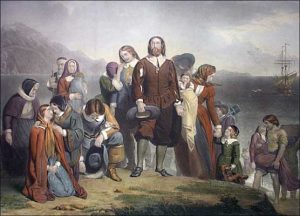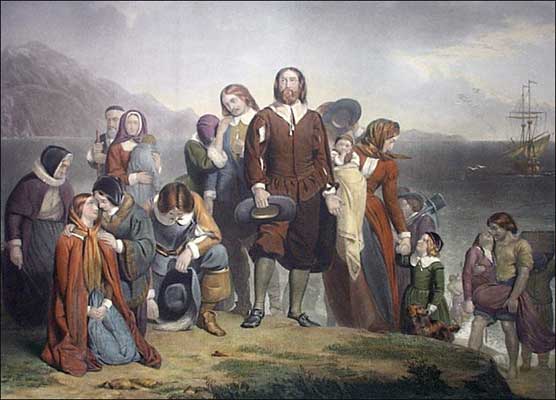Something that gives me hope in a dark time
 Wolf Howling sent me a very beautiful passage from the diary of a French Huguenot who arrived in South Carolina in the 1680s. Here’s the quotation, bracketed with some history to explain the context in which it arose. All of it comes from The History of South Carolina Under the Proprietary Government 1670-1719
Wolf Howling sent me a very beautiful passage from the diary of a French Huguenot who arrived in South Carolina in the 1680s. Here’s the quotation, bracketed with some history to explain the context in which it arose. All of it comes from The History of South Carolina Under the Proprietary Government 1670-1719:
There is no record of the first French Protestants brought out by Petit and Grinard in the ship Richmond in 1680 . . . They must have been persons of some means, however small, for they were required to furnish their own provisions for the voyage. It is believed that they were settled on the east branch of Cooper River, and formed the nucleus of what was known as Orange Quarter, subsequently the parish of St. Denis. It has been conjectured that the first of these names was derived from the principality of Orange in the province of Avignon. The name of St. Denis is supposed to commemorate the battle-field of St. Denis in the vicinity of Paris, which was the scene of a memorable encounter in 1567 between the Catholic forces commanded by Moutmorency and the Huguenots led by Coligny and the Prince of Conde”, in which Montmorency was slain.
Some thirty families were settled here soon after the Revocation of the Edict of Nantes. Lawson, in his travels in 1700, found seventy families established on the Santee, following trade with the Indians and living “as decently and happily as any planter in these southward parts of America. The French,” he says, ” being a temperate and industrious people, some of them bringing very little effects, yet by their endeavours and mutual assistance amongst themselves (which is highly to be commended) have outstript our English who brought with ’em larger fortunes though (as it seems) less endeavour to manage their talent to the best advantage. They live,” he says, “like one family, and each one rejoices at the prosperity and elevation of his bretheren.” But it was through pain, travail, and anguish that these noble people accomplished what they did. A letter of one of the first to arrive, the mother of Gabriel Manigault, who in a long and useful life was to accumulate a fortune so large as to enable him to aid the asylum of his persecuted parents with a loan of $220,000 for carrying on its revolutionary struggle for liberty and independence, has been preserved by Ramsay, which, after giving a most touching and piteous account of escape from France and suffering on their voyage to Carolina, thus relates their bitter experience there :
After our arrival in Carolina,” she writes, ” we suffered every kind of evil. In about eighteen months our elder brother unaccustomed to hard labor we were obliged to undergo died of a fever. Since leaving France we had experienced every kind of affliction — disease — pestilence — famine — poverty — hard labor. I have been for six months together without tasting bread, working the ground like a slave ; and I have even passed three or four years without always having it when I wanted it. God has done great things for us ena bling us to bear up under so many trials. I should never have done were I to attempt to detail to you all our adventures. Let it suffice that God has had compassion on me and changed my fate to a more happy one, for which glory be unto him.”
The Huguenots at first cultivated the barren highlands, and naturally attempted to raise wheat, barley, and other European grains upon them until better taught by the In dians. Tradition relates that men and their wives worked together in felling trees, building houses, making fences, and grubbing up their grounds until their settlements were formed ; and afterwards continued at their labors at the whip-saw, and in burning tar for market. General Peter Horry stated that his grandfather and grandmother began the foundation of their handsome fortune by working together at the whip-saw. . . . (pages 319 et seq.; emphasis mine.)
After reading the language that I emphasized, both Wolf Howling and I were struck by the fact that the writer, rather than railing against God for putting her in such horrific situations, thanked God for saving her when she was in need. It’s a very different mindset from our blame culture. It reveals a cruel, dangerous world in which people still saw meaning and purpose to their lives. It is the opposite of the nihilism that Marxism (which we see at its genocidal worst in the Nazis and the Soviets) has engendered in our society, where God, if he’s not dead, is a cruel entity who makes people suffer.
People who can look ahead and see the light are much more likely to be people who create a strong, mentally healthy, dynamic society. They’re powered by grace, not greed and evil.
But here’s some good news. While traveling, one of my Little Bookworms met a college student who is a devout Christian. Little Bookworm brought to my attention a Facebook post this young woman wrote, in which she displays the same spirit as that long-ago Huguenot in what became south Carolina.
To preserve this young woman’s privacy, I’m going to alter the words she used, although not the ideas she expressed:
God’s ways are mysterious to me, but he is always there, even in the worst of times, bringing me joy. I learned today that an operation I had a year ago failed and that I will have to go through the procedure again. This was very hard for me to hear, because the surgery interferes with the plans I had made, and I’m afraid that the last surgery might have caused harm that cannot easily be repaired. I ask you, my friends, to send your prayers that the surgery goes well and finally resolves the problem. And I remain grateful to God, my rock and my redeemer, in both good times and bad.
My Little Bookworm, raised in a secular environment, found the message peculiar. I on the other hand, felt hope after reading it — and did send this young woman my prayers. I may not be a religious, devout, or spiritual woman, but I recognize that there is something greater than we are out there, and I know that gratitude is the foundation of a good life and a good country.

